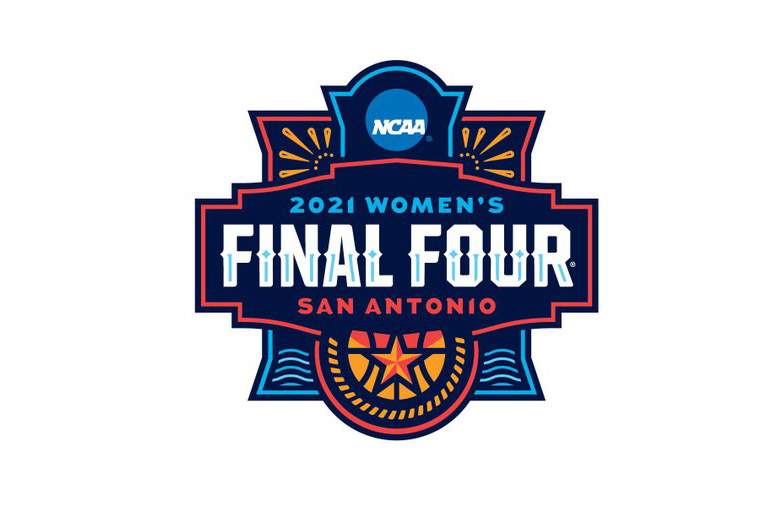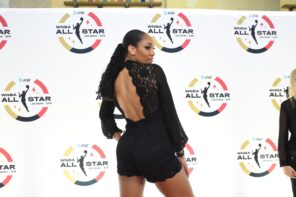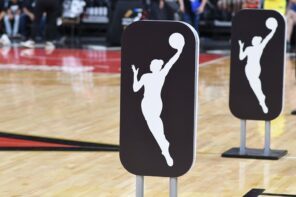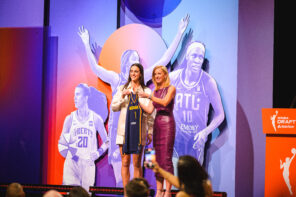Being a women’s athlete – or even a backer of women’s sports as we are here at Beyond The W – can be a completely thankless struggle at times.
Throughout history, while men’s sports have been the target of more support, more resources and (here’s the important one) much more money from those in decision-making positions, women have had to fight and fight and fight and fight just for the table scraps.
This is because throughout history most of those in decision-making positions have been (white) men, who have allowed their misogyny and woman-hatred to constantly dictate a lack of resources and attention being put towards men in sports in comparison to their male counterparts.
What Mark Emmert, the NCAA and other executive dinosaurs maintain the caveman mindset that Title IX is simply the “Lesbians’ Bill of Rights” do not understand is that times are changing and they would be better off adapting. Because we all know what happens when one does not adapt.
It perishes.
Shortchanging our queens of the court the way Emmert and the NCAA tried to do (before Oregon’s Sedona Prince went viral on TikTok for exposing Emmert as an emperor (no Searcy) sans clothes) may have sent a message that a woman athlete is inferior in the 1980s.
Here is their problem – it is not the 1980s anymore. All Emmert and the NCAA did with its atrocious planning for March Madness in San Antonio (yeah, Indianapolis – March Madness is a women’s thing too) is galvanize the women’s sports community to get behind these young women even more so than we already were.
Basketball players who launched the #NotNCAAProperty protest have sent a letter to NCAA president Mark Emmert to discuss #NIL and the discriminatory treatment of female athletes during #MarchMadness. pic.twitter.com/i7vkyvUxDd
— Darren Heitner (@DarrenHeitner) March 22, 2021
So, yeah – we are really clearing our schedules to make sure we watch as much of the women’s March Madness as possible (from the first tip of the first game to when the triple zeroes hit at the conclusion of the national championship). We are not going anywhere – we are here and we are here to stay.
And what the NCAA probably also does not like is that there has been pressure applied to it from all directions. It has not been only current women’s and men’s players and coaches that have read the league for filth. It has been luminaries from other sports – including the NBA – as well as prominent media members as well as politicians.
Outrageous! @ncaa should be ashamed. https://t.co/PCeAeacQCj
— Buffy Wicks (@BuffyWicks) March 21, 2021
This is outrageous, @NCAA. It needs to be fixed. Now. https://t.co/UWTN9iwIkR
— Chuck Schumer (@SenSchumer) March 19, 2021
The status quo of treating college athletes like cogs in the NCAA’s multi-million dollar profit pumping machine has gone on for too long. Real, meaningful change needs to happen. That’s why @SenBooker & I introduced the College Athletes Bill of Rights Act.
— Richard Blumenthal (@SenBlumenthal) March 19, 2021
I love every thing about @dawnstaley … we all must stand up for #whatmatters ! https://t.co/PP7xPB8HXE
— Jaime Harrison, DNC Chair (@harrisonjaime) March 20, 2021
For the knuckleheads at NCAA headquarters in Indianapolis who only know two sports – football and men’s basketball – they need to realize that in the age of Me Too and Black Lives Matter, women (especially Black women) are no longer satisfied with crumbs. They deserve a piece of the pie as as well and if you are unwilling to give those women a seat at the table, these women will bring their own chairs.
They will bring their own chairs just as they have brought their A-games to Central Texas. So many of the games of the tournament’s opening round have been scintillating to watch. From Georgia Tech-Stephen F. Austin to Wright State-Arkansas to BYU-Rutgers, how can anyone say hoops as exciting as this is something no one cares about?
Oh, yeah … that’s right.
Reading: March Madness: Treat NCAA women same as men or call it ‘Spring Sexism’ https://t.co/lCOGCGAnMp
— Jonathan Eisen (@phylogenomics) March 21, 2021
The NCAA needs to wake up and realize that the WNBA is about to enter its 25th season when plenty of doubters when the W first debuted in 1997 did not think it would last two or five seasons. It needs to recognize that the fastest growing sport in the NCAA is beach volleyball. Softball is a revenue sport. And do we need to say more about women’s soccer – including the meteoric rise of the NWSL, the success of the United States Women’s Soccer Team and their fight for equal pay.
Let us also not forget the NWHL, which is reportedly on the verge of adding its seventh team (most likely in Montreal). And in the wrestling realm, women have risen from being simply sideshow sex symbols for the male gaze to exceling primarily as athletes and being promoted as such first.
A lot of sports executives (including those at the NCAA) will never say this on the record because saying so in 2021 will likely mean the ends of their careers – but they clearly are of the mindset that women’s sports do not have a market. Women’s sports have a market – one that is growing day by day and an existing one that is only sharpened when sexist dreck is pulled like what the NCAA did in San Antonio.
@NCAA Our teammates have worked quickly to get truckloads of fitness equipment ready to send to the women’s @ncaawbb @marchmadness bubble – we are standing by to deliver it and have your facility outfitted within hours! Let’s make this happen. pic.twitter.com/6QJJjrrDgx
— DICK’S Sporting Goods (@DICKS) March 19, 2021
. @sedonaprince_ This is ridiculous. Let’s one up them. We’re sending 10 Tonal Smart Gyms that will arrive in San Antonio tomorrow for all of the players. Please DM us for next steps.
Good luck to all of the @marchmadness teams! https://t.co/3JqLO4SQ1t
— Tonal (@tonal) March 19, 2021
It should not have come to the point where companies like Orange Theory, Tonal and Dick’s Sporting Goods (one of the first major sports merchandising chains to carry WNBA merchandise by the way) had to fill the vacuum that the NCAA should have filled in the run-up to the tournament. But these companies did step up because they realize women’s sports deserve our respect 365 days of the year – not simply when Serena Williams, Naomi Osaka or Coco Gauff are competing in a tennis Grand Slam final or when USWNT is chasing a gold medal or World Cup.
Essence Carson put it best …
It’s all fun and games until they have a daughter…
— Essence T. Carson (@Pr3pE) March 19, 2021




